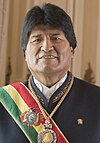| Julia Ramos | |
|---|---|
| Minister of Land and Rural Development of Bolivia | |
| In office 9 February 2009 – 24 January 2010 | |
| President | Evo Morales |
| Succeeded by | Nemesia Achacollo |
| Plurinational Deputy of Bolivia | |
| In office 24 January 2006 – 9 February 2009 | |
| President | Evo Morales |
| Constituency | Tarija Department |
| Personal details | |
| Born | Julia Damiana Ramos Sánchez (1963-04-12) 12 April 1963 (age 61) Tarija, Bolivia |
| Political party | Movement for Socialism |
| Alma mater | Universidad Juan Misael Saracho |
| Occupation | Nurse, politician |
Julia Damiana Ramos Sánchez (born 12 April 1963) is a Bolivian nurse and politician. She was a Plurinational deputy from 2006 to 2009, and Minister of Land and Rural Development from 2009 to 2010, during the first government of Evo Morales.
Biography
Julia Ramos was born in the city of Tarija on 12 April 1963. Her primary and secondary studies took place in her hometown. She continued with her education, studying nursing at the Universidad Juan Misael Saracho (UJMS), where she became a member of the executive committee of the Local University Foundation (Federación Universitaria Local; FUL).
Political career
Julia Ramos began her political career in small community posts. Between 1985 and 1989, beginning when she was 22 years old, Ramos held the positions of secretary of education and then secretary of health of the Single Trade Union Federation of Peasant Workers of Tarija (Federación Sindical Única de Trabajadores Campesinos de Tarija; FSUTCT). From 1996 to 1999, she joined the Bartolina Sisa Federation of the city of La Paz, reaching a position where her leadership could emerge at the national level.
After returning to Tarija, Ramos founded the first departmental section of the Bartolina Sisa Federation in that city, and became its main leader. She was re-elected twice, in 2000 and 2007. Ramos joined the militant Movement for Socialism (Movimiento al Socialismo; MAS), a party for which she was a candidate for deputy in the 2002 general election, but was not elected.
Three years later, in the following 2005 general election, Ramos was once again a candidate for deputy for MAS. This time she won, taking office on 24 January 2006. While she was in the position of Plurinational deputy, Ramos presided over caucuses of indigenous South Americans (an initiative of the United Nations).
On 2 February 2009, President Evo Morales appointed her Minister of Land and Rural Development. On 24 January 2010, Julia Ramos was replaced in her position as minister by Nemesia Achacollo, a Chapare union leader.
Five years after leaving the ministry, in 2015, Julia Ramos was linked by the courts to the Indigenous Development Fund (Fondo de Desarrollo Indígena; FONDIOC) corruption case.
References
- "Presidente: Juan Evo Morales Aima". Mira Bolivia (in Spanish). Archived from the original on 15 June 2017. Retrieved 3 November 2017.
- "Detención preventiva en Obrajes para Julia Ramos" [Preventive Detention in Obrajes for Julia Ramos]. El País (in Spanish). 1 December 2015. Retrieved 3 November 2017.
- ^ "Julia Ramos monta proyecto del Fondo Indígena en su casa" [Julia Ramos Assembles Indigenous Fund Project in Her House]. El País (in Spanish). 11 May 2015. Retrieved 3 November 2017.
- "Tarija sigue siendo bastión mirista" [Tarija is Still a Mirista Stronghold]. La Razón (in Spanish). La Paz. 1 July 2002. Archived from the original on 31 May 2019. Retrieved 3 November 2017 – via bolivia.com.
- "Diputada apoya la expulsión de acusados en el caso Cecilia" [Deputy Supports the Expulsion of Defendants in the Cecilia Case]. ABC Color (in Spanish). 28 May 2006. Retrieved 3 November 2017.
- "Dos exministras de Desarrollo Rural en la cárcel por el Fondo Indígena" [Two Ex-Ministers of Rural Development in Prison for the Indigenous Fund]. El Diario (in Spanish). 12 August 2016. Retrieved 3 November 2017.
- Gurachi, Angel (1 December 2015). "Juez envía a la cárcel a la exministra Julia Ramos por el caso ex Fondo Indígena" [Judge Sends Ex-Minister Julia Ramos to Prison in the Case of the Former Indigenous Fund]. La Razón (in Spanish). La Paz. Retrieved 3 November 2017.
- Melendres, Miguel Ángel (27 November 2015). "Arrestan a exministra Julia Ramos por Fondo Indígena" [Ex-Minister Julia Ramos Arrested for Indigenous Fund]. El Deber (in Spanish). Archived from the original on 12 December 2015. Retrieved 3 November 2017.
- "Detienen a exministra Julia Ramos por caso exFondioc" [Ex-Minister Julia Ramos Detained for ex-Fondioc Case]. Página Siete (in Spanish). La Paz. 26 November 2015. Retrieved 3 November 2017.
| Cabinet of President Evo Morales (2006–2019) | ||
|---|---|---|
| Vice President |
|  |
| Foreign Affairs |
| |
| Presidency |
| |
| Government |
| |
| Defense |
| |
| Development |
| |
| Economy |
| |
| Hydrocarbons |
| |
| Energies |
| |
| Productive Development |
| |
| Public Works |
| |
| Mining |
| |
| Justice |
| |
| Transparency |
| |
| Labor |
| |
| Health |
| |
| Sports |
| |
| Environment |
| |
| Water |
| |
| Education |
| |
| Rural Development |
| |
| Cultures |
| |
| Communications |
| |
| Legal Defense |
| |
| Autonomies |
| |
| Microenterprises |
| |
- 1963 births
- Government ministers of Bolivia
- Living people
- Members of the Chamber of Deputies (Bolivia)
- Bolivian nurses
- People from Tarija
- Women government ministers of Bolivia
- Women nurses
- Women members of the Chamber of Deputies (Bolivia)
- 21st-century Bolivian politicians
- 21st-century Bolivian women politicians